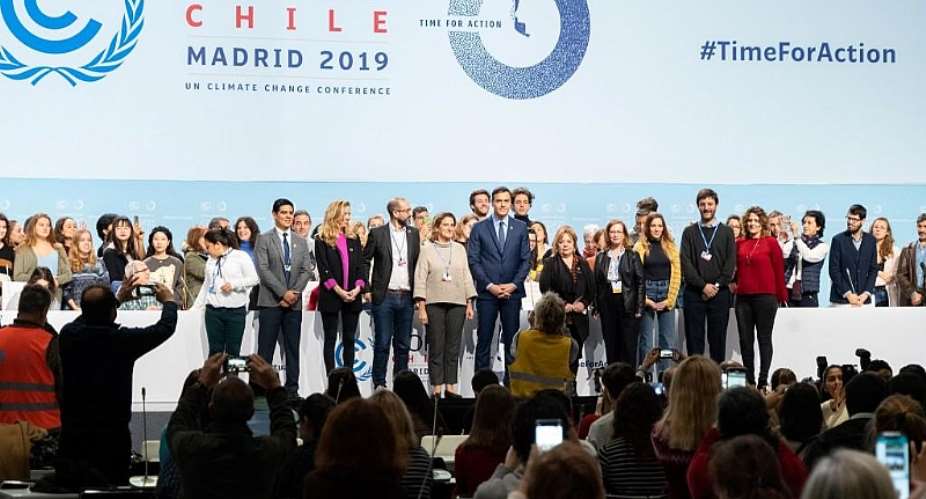African Civil Society has denounced the lack of firm commitments to deep emission cuts from industrialized countries that reflect the scale and urgency of the unfolding climate crisis.
National delegates to the UN climate change conference (COP25) in Madrid failed once more to step up to the existential challenge of the climate crisis, after two weeks of negotiations.
COP25 President, Carolina Schmidt, lamented “the agreements reached by parties are insufficient to tackle the crisis of climate change with urgency. There is still no consensus to raise ambition to the levels needed”.
Acknowledging countries indebtedness to the planet, she noted “the world is watching us and is waiting for concrete solutions from us. For this reason, today we are not satisfied”.
Governments agreed unanimously on the state of urgency and the need to increase ambition to respond to climate change in the next half of the century, inviting countries to update their Nationally Determined Contributions (NDCs) and to commit to carbon neutrality by 2050.
But the Conference did not achieve an agreement regarding Article 6 and the carbon market, one of the fundamental aspects to operationalize the Paris Agreement.
The African Group of Negotiators had pushed for ambitious decisions that reflect the special circumstances and needs of Africa commensurate with the unfolding climate emergency.
As floods, drought, advancing desertification and storms take their devastating toll on communities, important resources that should be going towards meeting social and economic needs are diverted to emergency response.
“For Africa, true to the language of the Paris Agreement, there have always been three related and equally important aspects to ambition: Ambition with regard to improving our NDCs, Ambition with regard to an adaptation goal and associated action; and Ambition on means of implementation,” said Barbara Creecy, President of the African Ministerial Conference on the Environment (AMCEN).
Adaptation finance remains crucial for Africa’s people in the face of deteriorating living conditions as a result of extreme weather phenomena associated with climate change.
“Without adequate means of finance developing countries face almost insurmountable barriers to participating in the war on climate change. It is important that the search for solutions to this continues,” said AMCEN President.
African Civil Society is disappointed with the lack of clear commitment to previously pledged climate finance and new scaled-up finance, particularly to fund gender-responsive adaptation and loss and damage.
“It is quite distressing that at COP25 there is still disagreement on a universal definition for climate finance, which risks further delaying badly needed financial support to developing countries and ensuring accurate climate finance reporting,” said the Pan-African Climate Justice Alliance (PACJA) in a statement.
Financial flows from developed countries to pay for adaptation, loss and damage as well as the Gender Action Plan remain main priorities for African countries.
Developed country parties must, therefore, provide enhanced, predictable, adequate and grant-based climate finance to developing country parties, while continuing to fulfil their pre-2020 climate finance commitment of US$100 billion per year during the period.
Hundreds of climate activists engaged in a peaceful but loud protest close to the plenary halls of COP25 as ministers dragged their feet on negotiations inside.
But governments cannot ignore the groundswell of public opinion demanding an urgent response to the climate crisis in entering a ‘decade of ambition’ that must see transformative policies to keep global temperature rise below 1.5 degrees Celsius.
By Kofi Adu Domfeh





 Akufo-Addo commissions Phase II of Kaleo solar power plant
Akufo-Addo commissions Phase II of Kaleo solar power plant
 NDC panics over Bawumia’s visit to Pope Francis
NDC panics over Bawumia’s visit to Pope Francis
 EC blasts Mahama over “false” claims on recruitment of Returning Officers
EC blasts Mahama over “false” claims on recruitment of Returning Officers
 Lands Minister gives ultimatum to Future Global Resources to revamp Prestea/Bogo...
Lands Minister gives ultimatum to Future Global Resources to revamp Prestea/Bogo...
 Wa Naa appeals to Akufo-Addo to audit state lands in Wa
Wa Naa appeals to Akufo-Addo to audit state lands in Wa
 Prof Opoku-Agyemang misunderstood Bawumia’s ‘driver mate’ analogy – Miracles Abo...
Prof Opoku-Agyemang misunderstood Bawumia’s ‘driver mate’ analogy – Miracles Abo...
 EU confident Ghana will not sign Anti-LGBTQI Bill
EU confident Ghana will not sign Anti-LGBTQI Bill
 Suspend implementation of Planting for Food and Jobs for 2024 - Stakeholders
Suspend implementation of Planting for Food and Jobs for 2024 - Stakeholders
 Tema West Municipal Assembly gets Ghana's First Female Aircraft Marshaller as ne...
Tema West Municipal Assembly gets Ghana's First Female Aircraft Marshaller as ne...
 Dumsor is affecting us double, release timetable – Disability Federation to ECG
Dumsor is affecting us double, release timetable – Disability Federation to ECG
